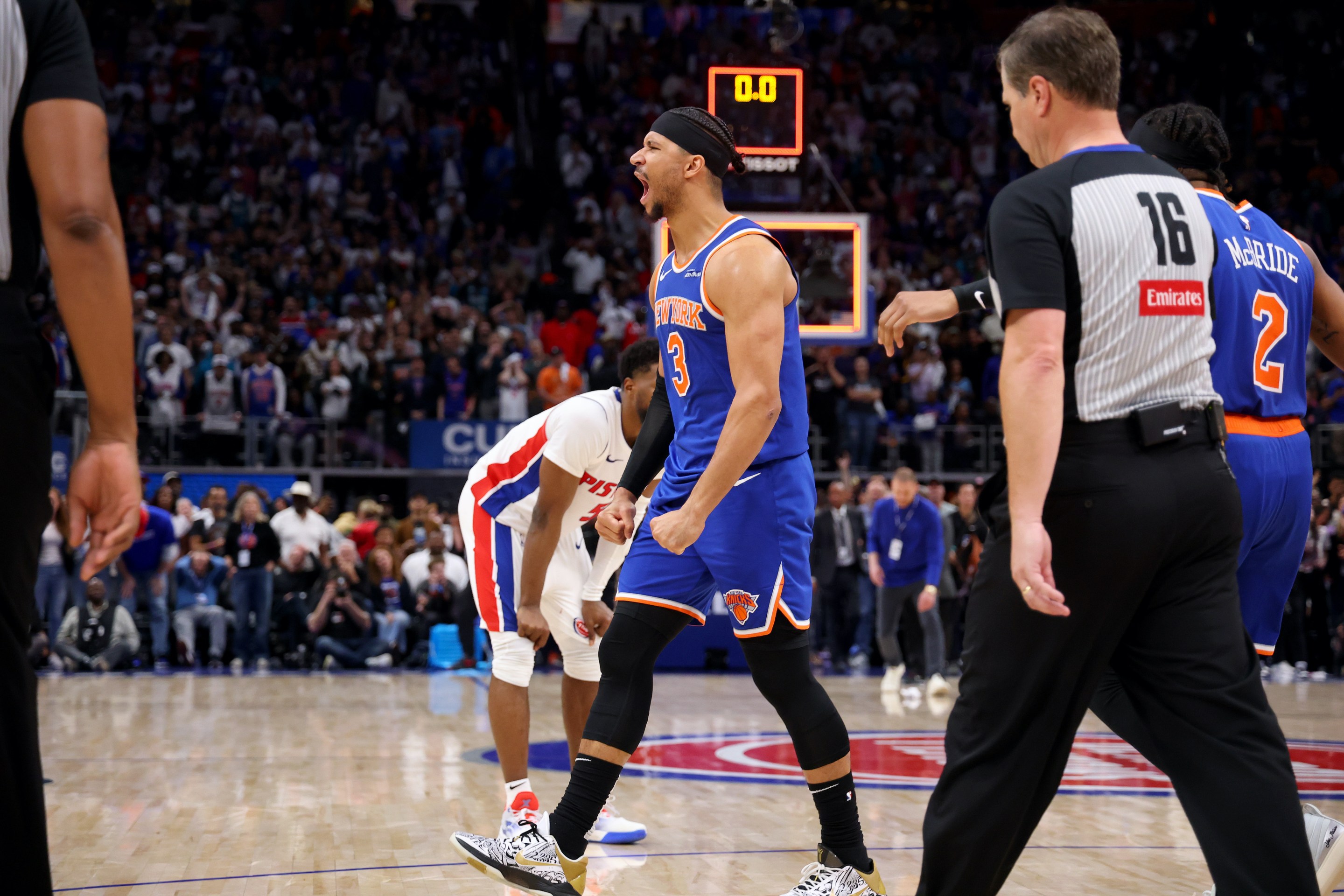In mid-November, 12 matches into the season, we here at Defector wondered if Aston Villa's Premier League campaign might be a mirage. Turns out, it both was and wasn't. The Lions' shocking title contender status back then, when their 25 points put them just three behind Manchester City at the top of the table, did indeed evaporate as the season went on. However, in terms of what was always the team's more realistic goal of qualifying for the Champions League, Villa is now in even stronger position than it was then. After 12 games Villa sat in fifth place, one point behind Tottenham. Today, with only four matches left in the league season, Villa is in fourth, six points ahead of Spurs, who've played two fewer matches. And while success of this magnitude is always a team effort, no one player has contributed more to getting Villa here, on the cusp of making its Champions League dream a reality, than Ollie Watkins.
As nutty as it is to see Aston Villa in the table's nosebleeds so late in the season, Watkins's place on the individual charts is somehow even more mind-boggling. The English striker's 19 goals in league play are only one fewer than joint–top scorers Erling Haaland and Cole Palmer. When you take penalties out of the equation, Watkins claims the top spot alone, his 19 three higher than the 16 Haaland and Dominic Solanke have scored. Not only that, he leads both the Premier League and Europe's big five leagues in assists, with 12. It's not every day that a dependable but mostly unexceptional midtable forward all of the sudden starts putting up Luis Suárez numbers at the age of 28.
It is a credit to manager Unai Emery's eye and Watkins's work ethic that the forward has played such effective soccer this season. However, there's actually not all that much new to Watkins's game. He has long possessed an enviable array of skills: strength, speed, tireless and selfless running on and off the ball, a soft touch, a hard and accurate shot. The difference this year is more in usage than development. Like a golf pro offering a few pointers to a driving range phenom—a tweak of the grip, an aiming tip—that immediately gets the latter stroking bombs straight down the fairway on a real course, Emery has unleashed Watkins by better honing and directing the raw materials that were already there.
The old Watkins's versatility was in some ways a limitation. By trying to do so much—to get involved in play, to threaten the space behind the center backs, to stretch the width of the field, to beat players off the dribble—he often found himself either away from the areas of the field where a striker's contributions are most lethal, or, when in those positions, short of the mental and physical freshness needed to be most effective. The new Watkins is much more focused on making an impact in and around the penalty area. That means less racing into wide channels, less touching the ball outside of the final third, more staying high and centrally, more getting the ball in the most dangerous areas of the pitch, more goals, more assists.
As such, Watkins's goals and assists have swelled to their present state, which has Aston Villa on the Champions League's doorstep. The goals are the headliners, and his proficiency in front of goal, coupled with his newfound ability to get himself in scoring positions more frequently, that has lifted him into a different echelon this season. Nevertheless, his scoring stats themselves are just the tangible outcomes of his consistent, devastating performances, which can't be reduced into mere numbers. We can take Villa's game against Bournemouth from this past weekend as an example. Watkins did not score in the Villans' come-from-behind 3-1 win. He did, however, assist the two goals that put Villa ahead and then sealed the victory. You can see in both of them just how varied and impactful his talents are even when he's not the one kicking the ball into the net himself.
Moussa Diaby's 57th-minute goal starts with Watkins dropping into midfield, Bournemouth defender Illia Zabarnyi all but climbing onto his back, in order to help Villa circulate the ball. (Watkins's back-to-goal game has been his one major improvement compared to previous seasons.) Once the pass reaches him, Watkins controls the ball, fights off Zabarnyi, and passes it back to Pau Torres. Once free of Zabarnyi, Watkins immediately spins and goes sprinting back toward the hole in the Bournemouth back line that Zabarnyi had opened when wrestling with the striker. Torres sends the ball forward to Morgan Rogers, who is sitting in a big space Watkins's movement had created. Rogers turns, looks up and sees Watkins on the run, and zips a through ball down the pitch. Watkins has the beating of Zabarnyi, but his run has taken him a little too wide to give him access to the best angles for a shot or a pass. So, when he gets to the ball, the striker heel-chops inside, setting him up with an ideal diagonal view of the penalty box. He spots Diaby in an even more advantageous central position, slips a perfectly weighted pass to the Frenchman, and slows to a walk while he watches Diaby redirect the ball into the goal with an easy first-time finish.
Leon Bailey's 78th-minute strike bears more than a few similarities with Diaby's. Once again Watkins comes deep with a defender draped all over him to help in Villa's buildup. Again Watkins spins his defender and darts into open spaces, this time taking the ball with him. Once in the clear, Watkins spots Diaby ahead of him and plays the forward pass. The defense's attention then switches from Watkins to Diaby, which Watkins uses to his advantage to continue charging forward without anyone really tracking him. (A masterful use of defenders' blind sides is a hallmark of Watkins's game.) Diaby notices this, and passes the ball into the box right as Watkins is bursting behind the Bournemouth back line. Watkins runs onto the ball, touches it past the keeper, who was forced off of his line to confront the unmarked Watkins, and from a sharp angle hits a strong but errant shot toward the undefended goal line. Bailey is there on the far side to drive the ball into the net from point-blank range.
Clearly, Watkins is doing much more in both of those plays than can be adequately summarized by an assist stat. And that's just about the highest praise a player could receive. He is playing so well right now that not only is he putting up silly, record-breaking (in the Premier League era, no one has scored more goals for Aston Villa in one season than Watkins) numbers, but the numbers can't even do justice to how thoroughly he influences the way his team plays and wins. He's still doing most of the things he used to, but the new order and priorities of his interventions have made the whole way more productive.
After the events of the past week, Aston Villa's margins have shrunk. Due to the results in the most recent round of the three European competitions, England will almost certainly miss out on a fifth Champions League spot next season. (A short explanation for the uninitiated: the UCL's new format, which comes into effect next season, will give one extra qualification spot to the two big five leagues that have the best coefficient in European play. Barring some pretty unlikely outcomes, the two leagues in line to claim those extra UCL spots will be Italy and Germany.) Had the Prem gotten a fifth spot, Villa would already be all but guaranteed to play in the Champions League next season. Instead, it will now be an all-out war for fourth between Villa and Tottenham, who, as mentioned above, are currently six points behind Villa but with two games in hand.
Villa has already done the hard work, and if it can now just stay on course (Villa has the points, a slightly easier schedule, and a goal difference advantage over Tottenham) the Villans can celebrate a truly astounding accomplishment. And that's before taking into account the Conference League title the team is still in the running for, with a semifinal tie against Olympiakos filling out the run-in schedule. These kind of overachievements require a team full of great players, and in Emi Martínez, Douglas Luiz, Diaby, and Bailey, Villa has just that. Still, none of this would be possible without the emergence of a lodestar guiding the rest. Not many would've expected Ollie Watkins to transform into that star in his late 20s, but he has, and his brilliance is plenty bright enough to lead Villa right to the top.






